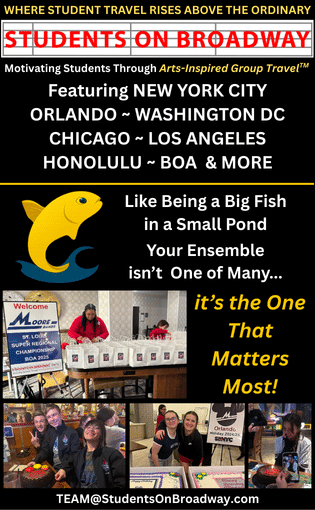When you publish several hundred magazines over eight decades, there isn’t always time to reflect. Once an issue reaches the printer, you are already working on the next one and the one after that. The benefit of this work treadmill is that you never dwell too long on your successes or failures. With this 80th Anniversary, we have had a rare opportunity to review almost everything we have done. In our exploration we found far too much information to fit in a single issue. There are huge subject areas that are passed over or touched on lightly in the anniversary. There will be additional coverage this year of marching, instrument clinics, timeless director advice, musical stories, and more in print and online. The content of this magazine is small cup of water drawn from a massive sea.
The first issue of the magazine arrived in the summer of 1946, with the embers of World War II flickering. Our grandfather, Traugott Rohner, already teaching full loads at both Northwestern University and the Evanston (Illinois) public schools, had a long simmering project to begin. He had published a small number of articles in existing publications and liked seeing his name in print. He decided that he could produce a better magazine for music teachers than what was available. Sharing the post-war optimism of the time, he put a second mortgage on his home and got to work. We have often wondered how that conversation went with our grandmother with whom he had three (soon to be four) young children at the time.
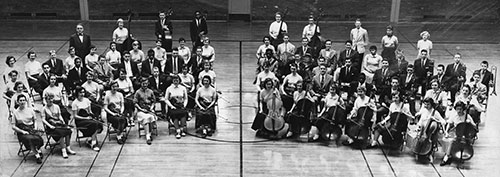
Evanston Township High School Orchestra under the direction of Traugott Rohner, with
My sister, Ann, and I recently looked through our grandparents’ check ledger from 1946 and found a mysterious notation for a $200 check that read “The Instrumentalist.” It isn’t clear what expenses this check (now worth about $3,300 today with inflation) would have covered. A new journey began.
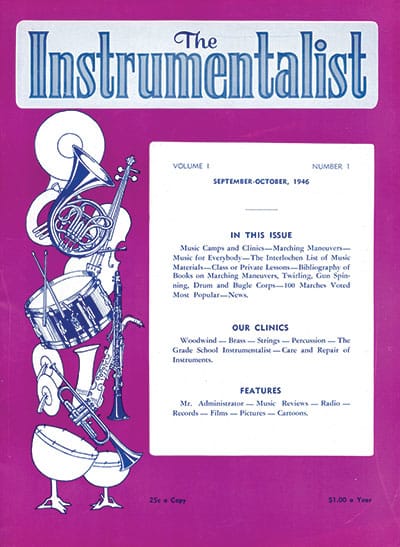
The first issue – September 1946
Over the next few years, our grandfather knew his idea was starting to catch on with educators across the country. After a stretch of small annual losses, the company made money for the first time in the mid-1950s. Around the same time, he came up with a second brilliant idea that continues today. While early profits remained lean, he continued his busy teaching duties, which included leading his outstanding high school orchestra program. As his musicians accompanied annual graduation ceremonies, he was annoyed that athletes from every sport received awards while outstanding band and orchestra musicians received little recognition for their many years of effort. He fixed the problem by establishing the John Philip Sousa Band Award and later the National School Orchestra Award. By the end of the 1950s, The Instrumentalist was thriving, and Traugott Rohner retired from teaching to focus on the business.
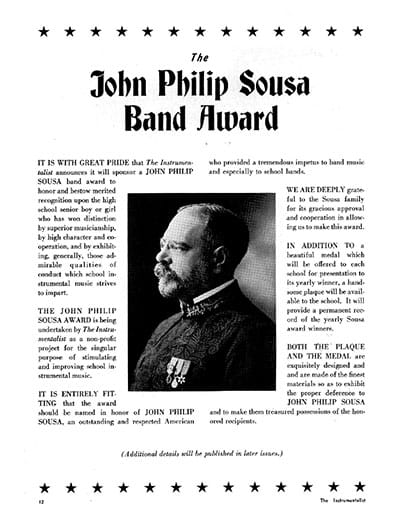
Sousa Award announcement – Nov. 1954
By the early 1970s, the magazine was continuing to excel and marked its 25th anniversary. Our grandfather’s creative mind continued to churn out ideas for various new endeavors. Unfortunately, his stamina and good health were starting to wane. Our father, James T. Rohner took a year-long leave from his law firm position to streamline operations at the magazine and never returned to the law. Father and son shared high intelligence and deep stubbornness and had different ideas about how to run a business. As happens in so many businesses, one era ended and another chapter began.
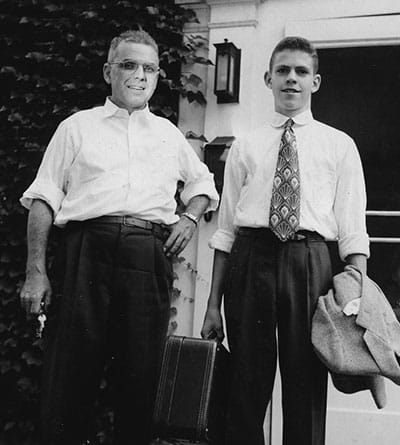
Traugott and James T. Rohner
In his 40 years at the helm, our father contributed to many high points in the history of the magazine. While our covers rarely changed much in the early years, covers from the 1970s and later regularly won awards. Interviews became a staple component of our coverage, and the range of people we interviewed was astonishing, including all-time great symphony conductors and performers, gifted composers, university conductors and teachers, and innovative middle school and high school directors.
While our father held the title of publisher, he acted for many years as more of an editor-in-chief, employing his disciplined legal mind to the task of wordsmithing. No edited article was approved a minute before it was ready. Sometimes, a particularly desultory editing job earned a dreaded comment in felt pen on the cover sheet: “Just start over.”
There are countless Instrumentalist alumni who have passed through our institution – some for an afternoon and others for a career. One who lasted a bit longer than many ended up hiring several former employees shortly after their time here ended. She remarked without sarcasm that anyone who could make it through an entire year with us could thrive as an employee in any job. She had a point. We are grateful to so many who have worked late nights and long weekends.
In past anniversary issues, we have given significant space to the early years of our history. While there are many interesting early articles that have stood the test of time, other articles and well-liked features in their day have aged less gracefully. That is inevitable. However, we used this anniversary as opportunity to shine a light on successes during our father’s four decades at the helm. Ann and I have learned so much working for him, even though we occasionally do something differently than he would suggest. He will still call us periodically from his home in warmer climes and complain about an article or an editorial choice we made. He forgets sometimes that he is the one who taught us to make up our minds and act. “Make choices,” he constantly implored us when we were waffling and uncertain.
Thirty years ago, our father wrote with good cheer and a slightly wistful tone about reaching the 50th Anniversary:
“Celebrations are often tinged with sadness because of the people who are not there or because the celebration will never be repeated. Many of the people mentioned in this issue died before some of the current subscribers were born, yet the ideas and achievements of those who came before live on. We would not have school music programs (today) if some of the legends had not worked, shared, and succeeded. This issue focuses on the ideas and achievements in instrumental music over 50 years. Although The Instrumentalist occasionally was a catalyst, it generally chronicled the achievements of others. What they accomplished made it possible for you, and for us, to start at a higher plane.”
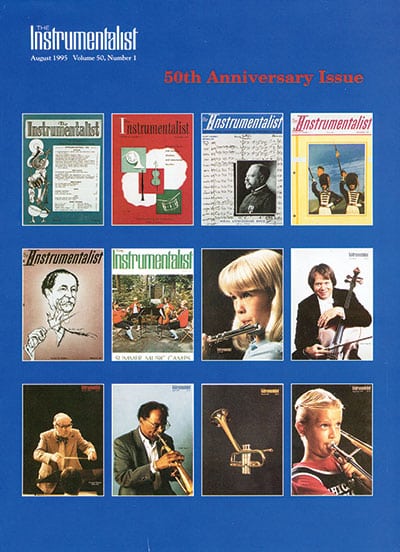
The 50th Anniversary – August 1995
One activity our father has enjoyed since his teenage years is sailing on Lake Michigan. After long days of work, the goal on many nights was simply to unwind, but there were still lessons. When the water wasn’t too rough, he’d hand the tiller to one of his three kids and tell us to pick a point on the horizon and steer for it. When the boat veered slightly off course, we learned to make an infinite number of small corrections. Steer and correct, again and again. We are no longer young, but still aim for perfection, always beyond our grasp. We know what to do because we were taught. We hope you enjoy the issue.
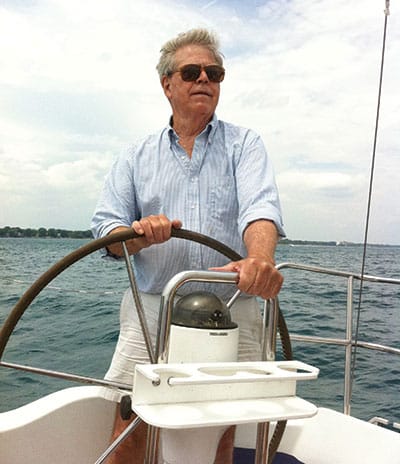
James M. Rohner/Ann Rohner Callis
Publishers



